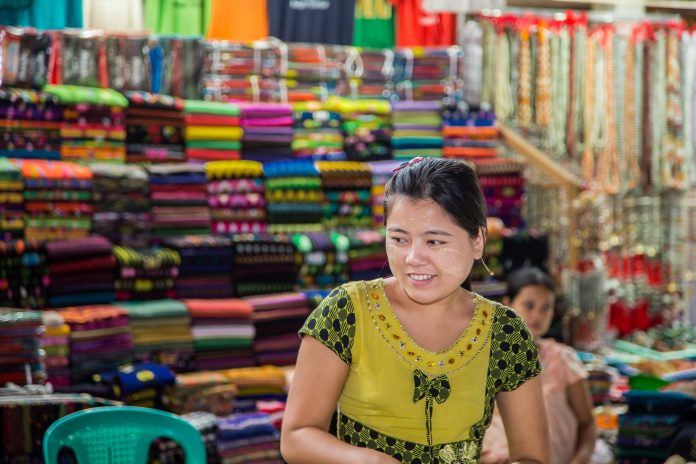UK International Development Secretary calls for most vulnerable to be given a say in Myanmar’s future after shifting the work of UK aid to help disadvantaged and conflict-affected people
On her first visit to Myanmar, International Development Secretary Penny Mordaunt called for the most vulnerable to be given a say in their country’s future after shifting the work of UK aid there to help disadvantaged and conflict-affected people.
Her words come after the ethnic cleansing of the Rohingya in Rakhine State and violations in Kachin and Shan States, all in Myanmar.
In Yangon, Ms Mordaunt met women who are being protected from modern day slavery, trafficking, gender inequality and poor sexual and reproductive health, at the Eden Project and Aung Myin Hmu, both supported by UK aid through the Department for International Development (DFID).
Women training at the Aung Myin Hmu project learn how to make garments safely in a factory setting, so they can go on to work for registered, safe and fair employers and support their families.
The garment sector in Myanmar is expected to grow from 400,000 to 1.5 million workers over the next five to 10 years, and these women migrants from Rakhine and Kachin will be protected from trafficking through better jobs and improved livelihoods.
Across the country, UK aid is providing life-saving humanitarian assistance in conflicted affected areas, and helping provide the healthcare, education and livelihood opportunities needed to build a more democratic, safe, and prosperous country.
UK aid is also providing life-sustaining humanitarian assistance to many of the Rohingya in Rakhine State, as well as to almost one million Rohingya refugees in neighbouring Bangladesh.
This visit follows the terrible violence in Rakhine in August 2017 when the British public donated incredibly generously towards the Rohingya crisis through the Disasters Emergency Committee (DEC) Appeal, raising £28 million, including £5 million matched pound-for-pound by the UK government.
International Development Secretary Penny Mordaunt said:
“I believe the British people want human rights to be at the heart of the work we do and for UK aid to be delivered in the smartest way possible.
In Yangon I’ve seen UK aid doing just that by tackling organised crime, protecting vulnerable girls from trafficking, training women to have jobs and livelihoods and giving British businesses confidence in the standards of their supply chains here.
The British public showed tremendous compassion for the Rohingya and it’s clear to me that protecting those who are still here and supporting them to live side-by-side and in peace in their communities is what we should be focusing on here in Burma.”
Around 600,000 Rohingya remain in Rakhine State. However, many Rohingya have been killed and over 700,000 have fled over the border into Bangladesh.
During her visit, Ms Mordaunt met Rohingya leaders and heard about the terrible conditions many Rohingya are now facing. Even those not caught up in the violence live in difficult conditions.
UK aid has been supporting the Rohingya in Rakhine state since 2012:
- More than 100,000 people have been given food or cash assistance including 24,000 children under the age of 5
- More than 100,000 people now have access to safe water
- UK aid has helped expand and refurbish Sittwe General Hospital
- 8,000 people across Rakhine State now receive sanitation services
- Almost 16 million people live in extreme poverty in Burma and one in every three children in Myanmar is malnourished.
Children who receive the right nutrition in their first 1,000 days complete more grades at school, earn up to 21% more as adults and are 10 times less likely to die of childhood diseases.
Poor nutrition is linked to 45% of child deaths and losses of up to 11% of GDP. DFID Myanmar is improving the nutrition of the poorest people. This is one of best development interventions that can be made – with every US$1 giving a return of US$16 from health and education outcomes.
Please note: Myanmar and Burma are the same place, but we are using the term Myanmar.





![Europe’s housing crisis: A fundamental social right under pressure Run-down appartment building in southeast Europe set before a moody evening sky. High dynamic range photo. Please see my related collections... [url=search/lightbox/7431206][img]http://i161.photobucket.com/albums/t218/dave9296/Lightbox_Vetta.jpg[/img][/url]](https://www.openaccessgovernment.org/wp-content/uploads/2025/04/iStock-108309610-218x150.jpg)





